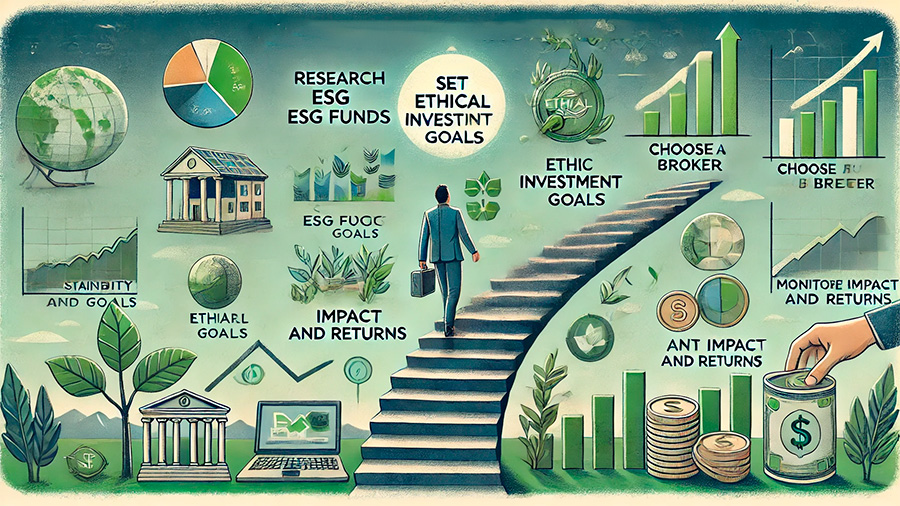Sustainable investing, also known as socially responsible investing (SRI) or environmental, social, and governance (ESG) investing, has gained significant traction in recent years. More investors are now looking for ways to grow their wealth while making a positive impact on the world. Whether it’s addressing climate change, promoting human rights, or ensuring good corporate governance, sustainable investments allow individuals to align their portfolios with their values.
In the past, ethical investing was often viewed as a trade-off between profits and principles. However, as sustainable investing grows, evidence suggests that you can achieve both financial returns and social impact. Many sustainable investments have shown strong performance, attracting a wide range of investors who seek to balance profit with purpose.
This article will explore the best sustainable investment options for ethical investors, helping you identify where to invest for both profit and positive change.
What Is Sustainable Investing?
Sustainable investing integrates environmental, social, and governance (ESG) factors into the investment decision-making process. Investors who prioritize sustainability seek to invest in companies that are not only financially sound but also have a positive impact on society and the environment.
Environmental, Social, and Governance (ESG) Criteria
When selecting sustainable investments, ESG criteria are often used to evaluate companies based on their practices and policies in three key areas:
Environmental: This factor focuses on a company’s environmental impact, including its carbon footprint, waste management, energy efficiency, and use of natural resources. Companies that invest in renewable energy, reduce emissions, or promote environmental sustainability score higher on the environmental front.
Social: The social criterion looks at how companies treat their employees, customers, and communities. This includes labor practices, diversity and inclusion, human rights, and how businesses contribute to societal well-being.
Governance: Good corporate governance ensures transparency, ethical leadership, and accountability within a company. Strong governance practices include fair executive compensation, anti-corruption measures, and shareholder rights.
By using ESG criteria, sustainable investors can identify companies that align with their values and are likely to deliver long-term financial returns by reducing risks associated with poor environmental, social, or governance practices.
Top Sustainable Investment Options for Ethical Investors
There are several ways to invest sustainably, from individual stocks to mutual funds and exchange-traded funds (ETFs). These options allow investors to diversify their portfolios while ensuring their money supports ethical companies and industries.
1. Green Bonds
Green bonds are fixed-income investments specifically designed to finance projects with positive environmental benefits. These bonds are typically issued by governments, corporations, or financial institutions to fund renewable energy projects, clean water initiatives, energy-efficient buildings, and other environmentally friendly efforts.
How they work: Green bonds operate like traditional bonds, offering regular interest payments and the return of the principal at maturity. The key difference is that the proceeds are exclusively used for environmentally sustainable projects.
Examples: The World Bank and European Investment Bank are major issuers of green bonds, financing large-scale renewable energy and sustainability projects globally.
Green bonds offer investors a way to support environmental sustainability while earning a fixed income, making them a suitable option for conservative investors seeking steady returns with a positive impact.
2. ESG-Focused Mutual Funds and ETFs
For investors looking for a diversified approach to sustainable investing, ESG-focused mutual funds and exchange-traded funds (ETFs) are excellent options. These funds invest in companies that meet strict ESG criteria, providing broad exposure to businesses committed to sustainable practices.
Mutual funds: ESG mutual funds are actively managed, meaning professional fund managers select companies based on their ESG performance and growth potential. These funds offer diversification across sectors and regions while aligning with ethical principles.
ETFs: ESG ETFs offer a lower-cost alternative to mutual funds. They track ESG indices, allowing investors to gain exposure to a broad range of sustainable companies without the need for active management. ETFs are more liquid and often have lower expense ratios than mutual funds.
Some popular ESG ETFs include the iShares MSCI USA ESG Select ETF (SUSA) and the Vanguard ESG U.S. Stock ETF (ESGV), which provide exposure to U.S. companies with high ESG ratings. These funds offer a simple and cost-effective way for ethical investors to gain diversified exposure to sustainable companies.
3. Renewable Energy Stocks
Investing directly in renewable energy companies is a powerful way to support the transition to a low-carbon economy. Renewable energy stocks focus on companies that generate power from sustainable sources, such as solar, wind, and hydroelectric energy. These companies are at the forefront of combating climate change and reducing reliance on fossil fuels.
Solar energy: Solar power is one of the fastest-growing renewable energy sources. Companies like First Solar and Enphase Energy are leaders in the production of solar panels and energy storage solutions.
Wind energy: Wind power is another key player in the renewable energy sector. Companies like Vestas Wind Systems and Siemens Gamesa focus on wind turbine manufacturing and installation, helping to increase global wind energy capacity.
Investing in renewable energy stocks offers the potential for high growth as the world transitions to cleaner energy sources. However, these stocks can also be more volatile, so they are best suited for investors with a higher risk tolerance.
4. Socially Responsible Real Estate Investment Trusts (REITs)
Real estate investment trusts (REITs) allow investors to invest in real estate without directly owning property. Some REITs are specifically focused on sustainable development, including green buildings, energy-efficient properties, and affordable housing initiatives. These REITs align with social and environmental goals while providing a steady income through dividends.
Green REITs: Green REITs invest in properties that meet sustainability standards, such as energy-efficient office buildings, eco-friendly residential developments, and properties with LEED (Leadership in Energy and Environmental Design) certification. Examples include Prologis and Kilroy Realty Corporation, which focus on sustainable and environmentally conscious real estate.
Affordable housing REITs: These REITs focus on providing affordable housing options to underserved communities, promoting social equity. Mid-America Apartment Communities and Equity Residential are REITs that focus on residential housing, including affordable living options.
Socially responsible REITs provide both income and growth potential while supporting sustainable urban development and social impact initiatives.
5. Impact Investing
Impact investing goes a step beyond traditional ESG investing by specifically targeting investments that aim to generate a measurable social or environmental impact alongside financial returns. Impact investors actively seek companies or projects that address global challenges, such as poverty alleviation, healthcare access, clean energy, and education.
Direct impact investments: Some impact investors choose to invest directly in startups, nonprofits, or social enterprises working to solve specific issues. This can include investing in microfinance institutions that provide loans to underserved populations or backing clean water initiatives in developing countries.
Impact investment funds: For a diversified approach, many investors turn to impact investment funds, which pool money to invest in projects aligned with social and environmental goals. Funds like the Calvert Impact Capital offer opportunities to support impactful projects across sectors such as renewable energy, education, and healthcare.
Impact investing is ideal for investors who want to take a proactive approach to addressing global issues while seeking financial returns. These investments often have higher risk but can generate significant positive change.

Why Sustainable Investing Makes Sense for Long-Term Investors
Beyond the ethical benefits, sustainable investments often outperform their traditional counterparts over the long term. Companies that prioritize sustainability are better positioned to manage risks, such as regulatory changes, environmental challenges, and shifting consumer preferences.
Lower Risk
Companies with strong ESG practices are more likely to avoid scandals, regulatory fines, and reputational damage. By focusing on sustainability, these companies can mitigate risks related to environmental impact, worker treatment, and governance issues.
Reduced regulatory risk: As governments implement stricter environmental and social regulations, companies that are already compliant will be better positioned to adapt without facing penalties.
Reputation management: Companies that focus on ESG criteria often build stronger brands and customer loyalty, helping them weather public relations crises more effectively.
Investing in companies that actively manage ESG risks can result in lower volatility and more stable returns over time.
Capitalizing on Global Trends
Global trends, such as the transition to renewable energy, increasing demand for sustainable products, and growing awareness of social issues, are driving significant growth in ESG-focused companies. By investing in these companies, investors can capitalize on the long-term opportunities associated with these trends.
Renewable energy growth: The renewable energy sector is expected to continue growing as countries shift away from fossil fuels and adopt clean energy sources. This presents substantial opportunities for investors in solar, wind, and energy storage companies.
Consumer demand for sustainability: As consumers become more conscious of their environmental and social impact, companies that offer sustainable products and services are likely to see increased demand, leading to higher revenues and market share.
By aligning with global sustainability trends, long-term investors can position themselves for both profit and positive change.

How to Get Started with Sustainable Investing
If you’re new to sustainable investing, getting started is straightforward. Here are the steps to begin building a portfolio that aligns with your values:
1. Define Your Values and Goals
Before you start investing, consider which issues are most important to you. Are you primarily concerned with environmental sustainability, human rights, corporate ethics, or all of the above? Defining your values will help guide your investment decisions.
Environmental focus: If climate change and environmental sustainability are your top priorities, focus on investments in renewable energy, green bonds, and companies with strong environmental practices.
Social impact: If you’re more focused on social issues like diversity, labor rights, or affordable housing, consider investing in socially responsible REITs, impact investment funds, or companies with strong social performance.
Having clear goals will ensure that your portfolio reflects both your financial objectives and your ethical values.
2. Research ESG Ratings and Funds
There are many tools available to help investors evaluate companies and funds based on ESG criteria. ESG ratings are provided by firms like MSCI, Sustainalytics, and Morningstar, which evaluate companies’ sustainability practices and assign scores based on their ESG performance.
Use ESG data: Research individual companies and funds to ensure they meet your ethical standards. Many investment platforms also offer ESG filters that allow you to search for funds with high ESG ratings.
Select diversified funds: For beginners, ESG-focused mutual funds or ETFs are a great way to start, as they offer broad exposure to sustainable companies without the need for extensive research into individual stocks.
ESG ratings and research tools can help you make informed decisions and ensure that your investments align with your values.
3. Start Small and Build Over Time
You don’t need to overhaul your entire portfolio all at once. Start by allocating a portion of your investments to sustainable assets and gradually increase your exposure as you become more comfortable with the process.
Dollar-cost averaging: Consider using dollar-cost averaging (DCA) to invest in sustainable funds over time. This strategy involves investing a fixed amount at regular intervals, reducing the impact of market volatility and ensuring consistent growth.
By starting small and steadily building your sustainable portfolio, you can reduce risk while aligning your investments with your values.
Final Thoughts: The Future of Sustainable Investing
Sustainable investing is no longer just a niche strategy—it’s becoming the new standard for ethical investors who want to achieve both profit and social impact. As global awareness of environmental and social issues continues to grow, sustainable investments are poised for long-term growth and success.
By investing in green bonds, ESG-focused funds, renewable energy stocks, and impact projects, you can align your portfolio with your values while capitalizing on the opportunities that come with sustainable development. Whether you’re just starting or looking to expand your sustainable investment portfolio, the options available today make it easier than ever to invest with purpose and achieve lasting financial returns.



